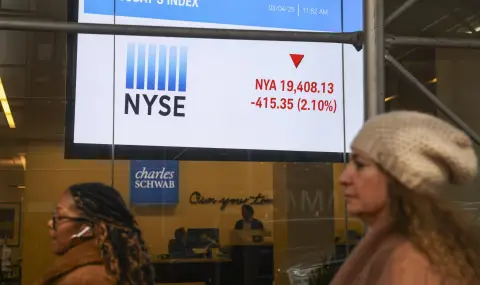Global stock markets plunged for a second day as new trade tariffs imposed by US President Donald Trump rocked the global economy. Major indexes in Asia, Europe and the US hit their lowest levels in years.
Japan's Nikkei posted a 9% weekly drop - its biggest since March 2020. The London and New York stock exchanges also recorded drastic losses, with companies in the S&P 500 index losing a combined $2.4 trillion in market capitalization.
President Trump described the decline as "expected" and compared the effect of the new tariffs to an operation on a "sick patient", claiming that it would lead to economic recovery. According to him, after the announcement of the measures, many countries sought contact with Washington with a readiness for negotiations.
"It was expected. We have a very sick patient. We inherited a terrible economy with many problems, including loss of production and closure of factories. We lost 90 thousand enterprises, which led to the loss of 6 million jobs. So this was a sick patient. Now, on Liberation Day, it has undergone an operation. And we will become a prosperous country. This is truly incredible. We know this because we are predicting trillions of dollars in revenue!"
However, financial analysts are skeptical. They warn that increased uncertainty could lead to a recession, curb business investment and inflationary pressures. The tariffs could reduce US GDP by up to 2 percentage points and raise inflation by up to 3%, according to Pictet Asset Management.
In currency markets, the euro rose to a six-month high after its biggest daily gain in nearly three years. The dollar index posted its weakest session since November 2022, while the yen and gold rose as safe havens for investors.
Oil prices also fell sharply - Brent fell to $68.86 a barrel and WTI to $65.66, marking their biggest weekly decline in months. The reason for this is the fear that trade wars will lead to a decline in global energy demand.
Analysts predict that if the United States continues its isolationist course, the European Union and China will strengthen their cooperation, and other countries will seek new trading partners. Meanwhile, Beijing and Brussels are preparing countermeasures, and central banks may be forced to ease monetary policy to prevent a deeper economic downturn.
